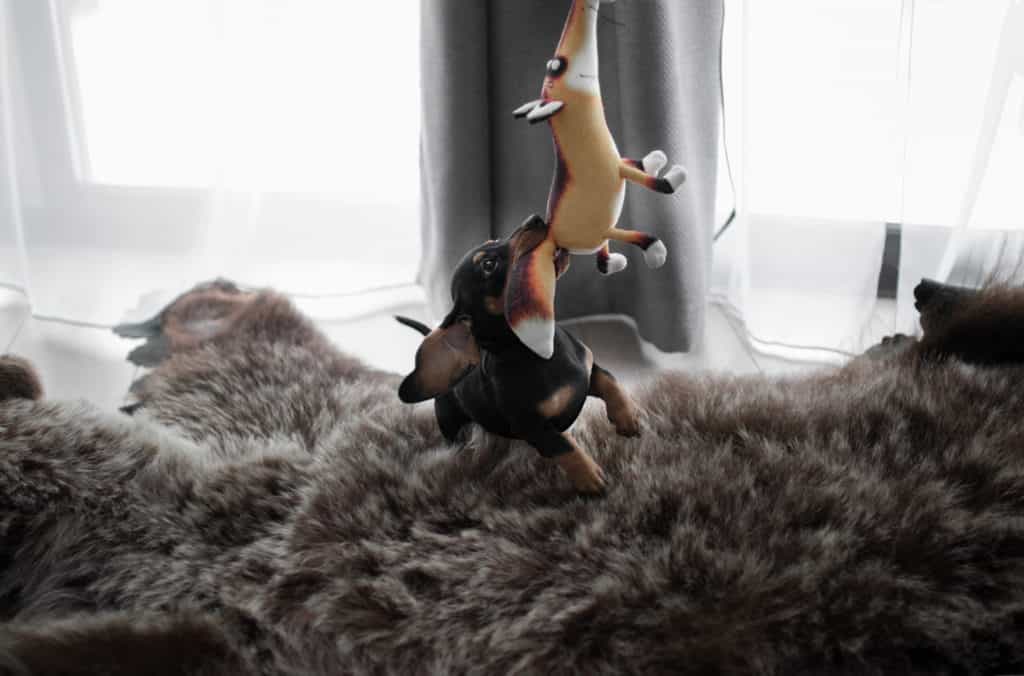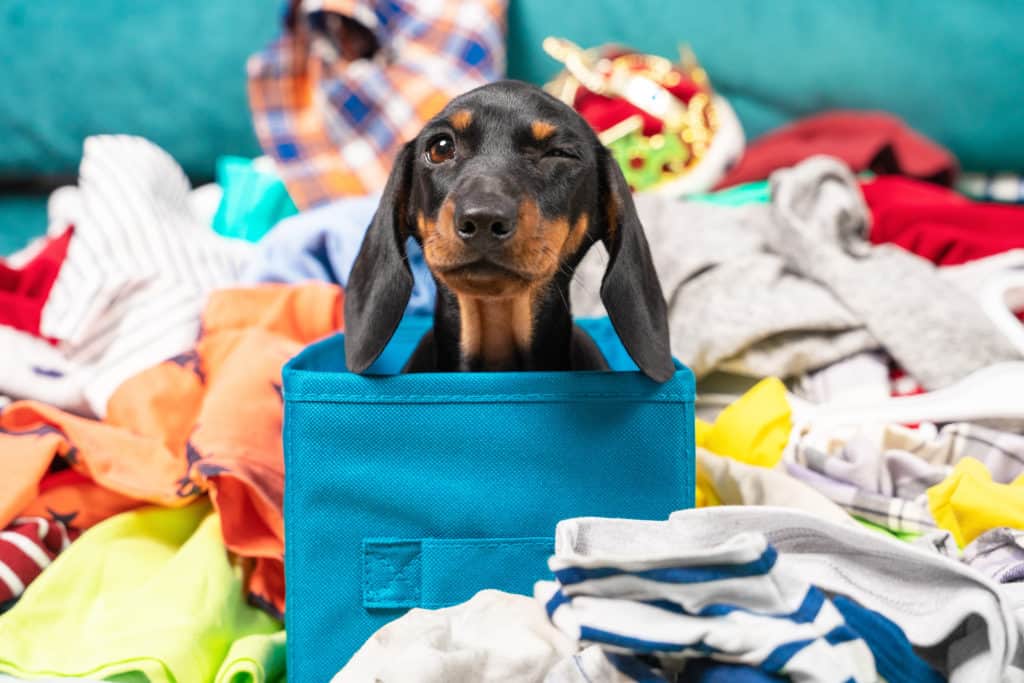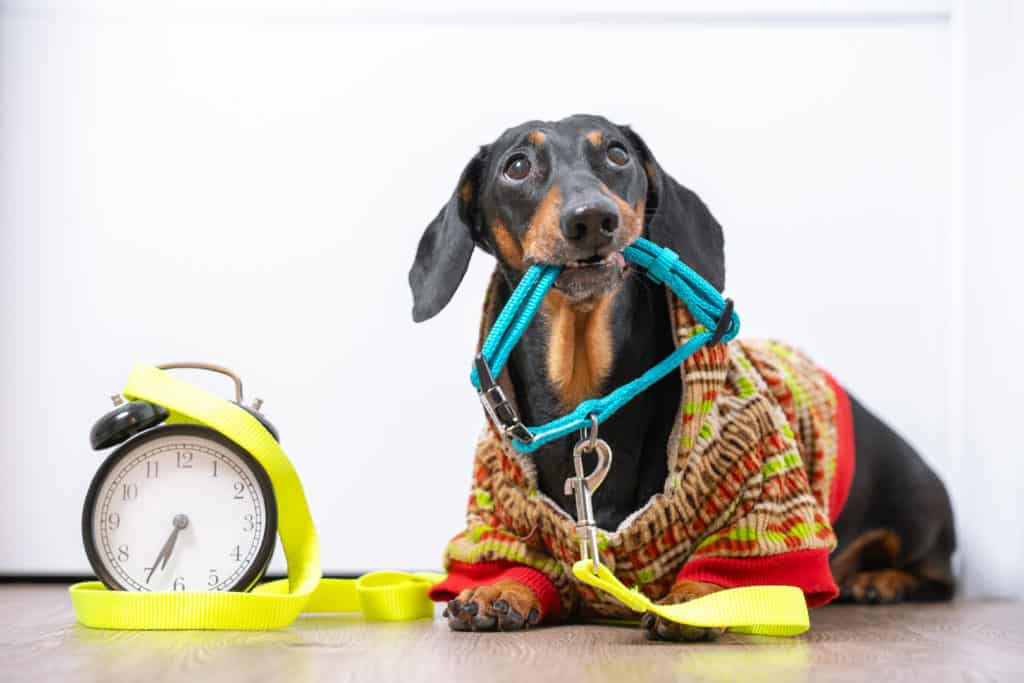
Why Does My Dog Go Crazy at Night?
So, you have had a long, hard day, it is late at night, and all you want is to go to bed and drift off as soon as possible. Guess what? Your dog suddenly decides this is the best time for it to jump around and play!
If you are a new pet owner, this might seem a bit awkward to you and you are probably thinking, “Why does my dog go crazy at night?”. But long-time dog owners will tell you that this behavior is completely normal in most cases.
This kind of crazy hyperactivity in dogs is commonly known as “zoomies” and almost every dog goes through this phase frequently. But why do zoomies occur? Is there any way you can prevent them? Read on to find out the answers to these questions.
What are Dog Zoomies or Frenetic Random Activity Periods (FRAPs)?
The scientific term for dog zoomies is frenetic random activity periods (FRAPs). FRAPs are times when your dog experiences a random burst of energy that causes it to either spin in wide circles or run extremely fast.
Such spurious activities typically last only for a few minutes. In most cases, there are signs that your dog might be getting the zoomies. There may be a sudden spark in its eyes, followed by a stretch of the front legs.
Before you know it, you might notice that your dog is frantically running at a hundred miles an hour, that is, if your dog is in an open space. If it is in a closed room, you would see it spin in large circles rapidly until it falls. Some dogs spin so fast that it appears they are trying to catch their tail.
Why Do Dogs Get the Zoomies?
Alright, so dogs get the zoomies. It may be fun to watch (if you aren’t sleepy and tired). But why does it happen?
First of all, there is nothing wrong with dogs getting the zoomies and you have to accept it to be a normal part of bringing a pet home. For most dogs, zoomies are a way to release pent-up energy and stress.
This is why you might have to deal with zoomies more in puppies than in older dogs at night. Even if you want to sleep, the puppy may not have exhausted its energy throughout the day and hence, it goes “crazy” at night.
Other reasons that dogs get zoomies include being aroused by other dogs, stressful dog-training classes, or being confined to a crate or a closed room for long hours.
Are Zoomies Bad?
Typically, no. Zoomies are a natural characteristic in dogs that aids in stress relief for your furry friend. If your dog did not get the zoomies, that would have been bad for it as having a lot of pent-up energy might cause your pet to get vicious.
However, as with everything else, there has to be a limit. Zoomies should ideally not last more than 10 minutes, and even that length of time is quite rare. So, if you feel that your dog is acting hyperactive for longer periods, there might be some underlying issue that the vet has to take a look at.
It could also mean that you are not exercising your dog enough or your dog is under some kind of chronic stress. In some cases, when you see your dog chasing its tail too frequently, it could also be a sign of obsessive compulsion. Related post: Dachshund diet and exercise

What to Do if a Dog Gets Zoomies?
Relax and breathe! In most cases, zoomies are completely harmless. A puppy running around trying to catch its tail is a fun moment and you are sure to find it more adorable than annoying.
Having said that, there is a time and a place for everything. You don’t want your dog to get zoomies when you want to catch some sleep, have guests over, or are taking a stroll in a park, where putting on a leash is a mandatory rule.
In such cases, you might want to calm down your dog. Although experts say that you should never try to stop a dog in the middle of the zoomies, there are still a couple of things you can do to keep things under control. Let us have a look at them.
How Do You Calm Zoomies?
Never, ever chase a dog with Zoomies. The reason is that when a dog is in a hyperactive state, all it wants is to play and jump around. If you chase the dog, it might get the wrong impression that you wish to play with it.
In such a case, your furball would run or spin even harder, making it all the more difficult for you to calm down the zoomies. Instead, try to run away from the dog so that it follows you to a safe space until it calms down.
Another way to control zoomies is to throw a toy in the direction where you want your dog to go and rest. It might end up following the toy and eventually relaxing.
Also, train your dog beforehand so that it understands that coming to you when called is a fun activity. As the dog is looking to have fun when in a hyperactive state, this strategy often works in keeping things under control.

Do Dogs Grow Out of Zoomies?
As zoomies are more common with puppies and young dogs, most dogs are likely to grow out of FRAPs as they get older. With the passage of years, you may see a reduction in the duration of the zoomies or may notice that your dog is experiencing the zoomies only after some activities, such as taking a bath.
However, if you notice such behavior not going away even as your dog ages, there may be some issues related to diet or other malfunctions such as hyperkinesis, whose symptoms are similar to attention deficit hyperactivity disorder (ADHD) in humans. Be cautious with the issue, though, as many times this disorder is overdiagnosed.
The best thing to do is to let your dog go through its zoomies in a safe environment where it has no chance of hurting itself or anyone else and your furry friend will be just fine.
Related post: Can dachshunds be left alone all day?
Understanding and Managing Nocturnal Restlessness in Dogs
We understand the challenges that come with a dog that goes crazy at night, and we’re here to provide you with expert insights and practical solutions to help you and your furry friend enjoy peaceful nights together.
Unraveling the Mystery: Why Does Your Dog Go Crazy at Night?
It’s not uncommon for dogs to exhibit heightened activity and restlessness during nighttime. Several factors contribute to this behavior:
- Natural Instincts: Dogs are crepuscular animals, meaning they are naturally more active during dawn and dusk. This behavior is rooted in their ancestry as pack animals, where these times offered better hunting opportunities.
- Pent-up Energy: If your dog hasn’t received sufficient exercise and mental stimulation during the day, it might experience a surplus of energy at night. This can lead to pacing, barking, and other restless behaviors.
- Environmental Stimuli: Nocturnal sounds and scents, such as nocturnal animals or distant noises, can trigger your dog’s alertness, causing them to become hyperactive.
- Separation Anxiety: Dogs that experience separation anxiety may become more agitated at night when they are left alone. This anxiety can manifest as destructive behavior or excessive barking.
Strategies for Managing Nocturnal Restlessness
- Regular Exercise: Engaging your dog in regular exercise, especially during the day, can help reduce nighttime restlessness. Activities like walks, playtime, and mental challenges provide an outlet for their energy.
- Interactive Toys: Introduce interactive toys that dispense treats or challenge your dog’s mind. These toys not only provide entertainment but also stimulate cognitive functions, helping your dog tire both physically and mentally.
- Establish Routine: Dogs thrive on routine. Set a consistent schedule for feeding, walks, and bedtime. This predictability can help regulate their internal clock and minimize nighttime disturbances.
- Calm Bedtime Environment: Create a calm and comfortable sleeping environment for your dog. Use a cozy bed and consider using soothing music or white noise to drown out external disturbances.
- Positive Reinforcement: Reward your dog for calm behavior during the night. Use treats or praise when they settle down, reinforcing the idea that quiet behavior is rewarding.
Seeking Professional Help
If your dog’s nocturnal restlessness persists despite your efforts, it might be wise to consult a veterinarian or a professional dog behaviorist. They can assess any underlying health issues or provide tailored guidance to address your dog’s specific needs.
Related post: Dachshund Exercise Needs: A Guide to Keeping Your Wiener Dog Active and Healthy
Conclusion
Dogs are adorable and they become doubly so when they feel more playful while going through zoomies. But of course, its hyperactivity can be a nuisance at night when you (and your neighbors) are hoping for a good night’s rest.
Although certain kinds of behavioral training such as recall can help calm down the zoomies, in most cases it is best to let it run its course. It does not last more than a few minutes, so getting it over with is ideal before you carry on with your activities.
Always make sure that your dog has a safe space to go through its zoomies so that no one gets hurt. And as with everything else, consult the vet if the zoomies run for a longer duration or do not go away as your dog ages.
Understanding why your dog goes crazy at night is the first step toward finding effective solutions. By following a consistent routine, providing mental and physical stimulation, and creating a tranquil sleep environment, you can significantly reduce your dog’s nighttime restlessness. Remember, a well-rested dog leads to a happier and healthier companionship for both you and your beloved pet.
Primary Sources
- https://www.adoptandshop.org/the-zoomies-what-are-frenetic-random-activity-periods/
- https://thebark.com/content/7-things-know-about-dog-zoomies
- https://www.dogster.com/dog-training/dog-zoomies
Recent Posts
Calculate the perfect food portions for your dachshund with our specialized calculator. Get customized feeding recommendations based on size, age, and activity level to support your wiener dog's back...
Looking for the perfect gift for a proud dachshund mom? We’ve rounded up the cutest dachshund shirts that celebrate your love for wiener dogs in style. Whether you’re shopping for yourself or a...



